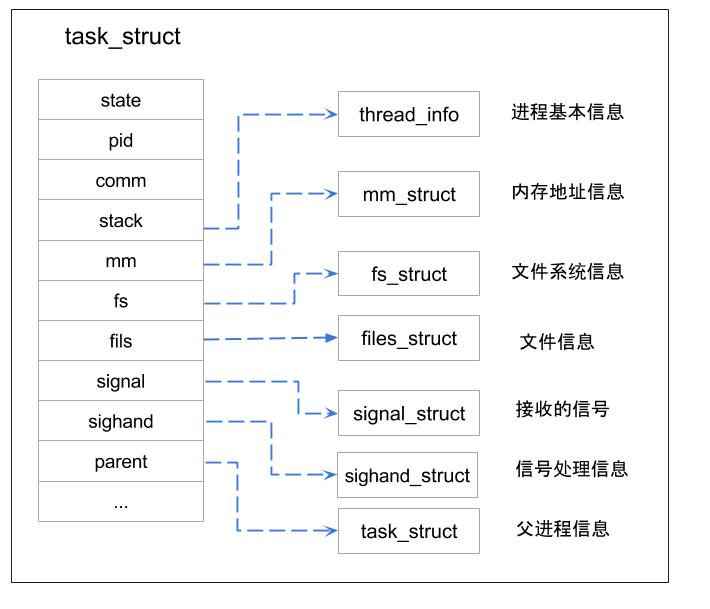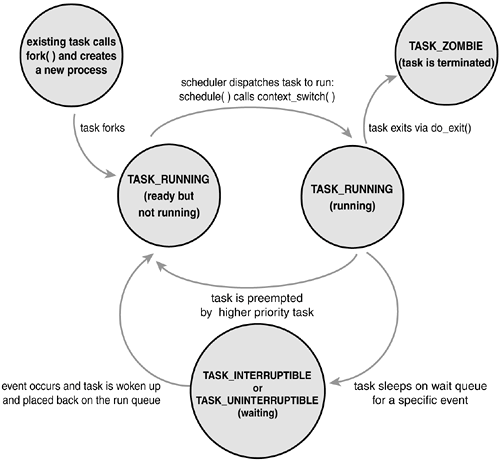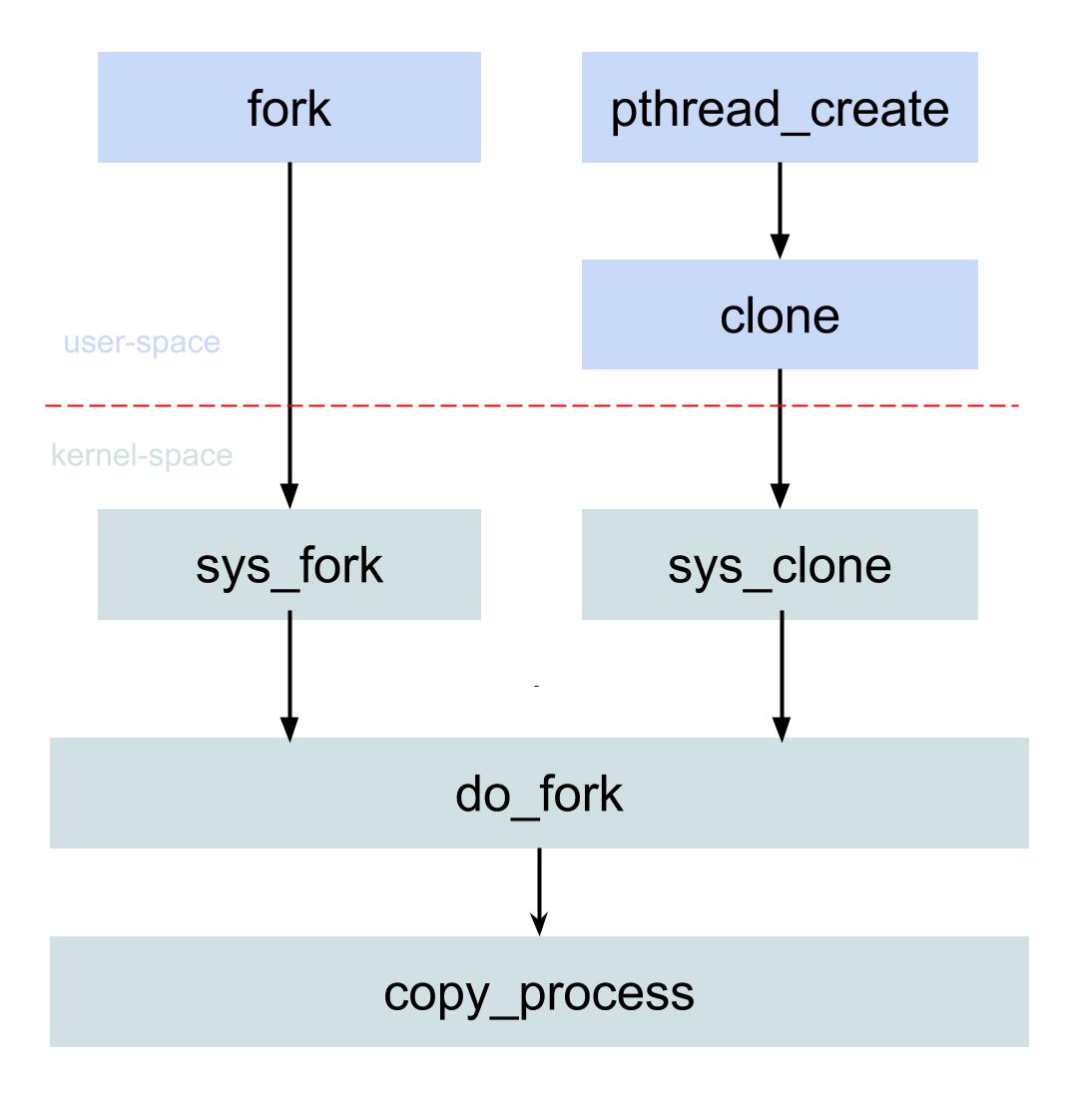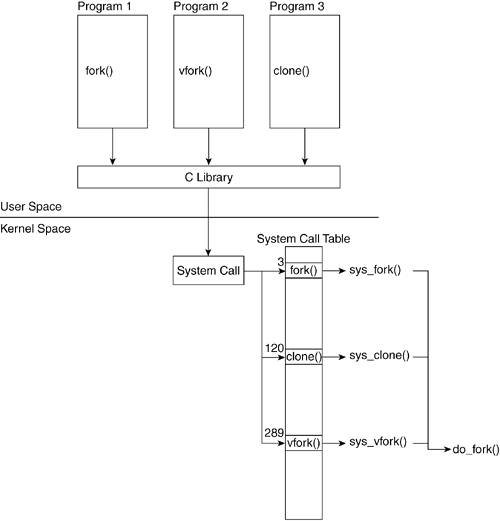What is process?
An instance of an executing program.
What is thread?
An execution flow of the process.
- Process vs. Thread
- Similarity
- Threads share CPU like process. (and only one thread active (running) at a time)
- If one thread is blocked, another thread can run
- Difference
- Threads are not independent of one another
- Threads are design to assist one other
Process might not because it may originate from different users
- All threads can access every address in the task
- Similarity
- linux/sched.h
task_struct: PCBtask_group
- Different process may share the same code.
- Like you open a application multiple times
- Process has its own system heap stack space
- The "private property"
- PCB (task_struct in Linux), a data structure to record a state of a process
- Make process to be a unit for kernel scheduling
- Also recording all the resource occupy by a process
- Process has independent storage, i.e. special user space.
Without the 4th condition, then call Thread
- Completely without user space => kernel thread
- Share user space => user thread
From the aspect of kernel, there is no concept of threads in Linux
- No scheduling for threads
- No data structure to represent a thread (unlike
task_structfor process)
Linux kernel does not priovide any special scheduling semantics or data structure to represent threads
(A thread is merely a process that shares certain resources with other processes)
Allow both parent and the child process to share many per-process kernel data structures
Between lightweight process, they can share some resources
- Address spce
- Opened file
- ...
POSIX Standard
- Wiki - POSIX - Portable Operating System Interface
Implementation of Thread in Linux
- LinuxThreads - Old
- Create N+1 thread, one of them is to handle resources
- Wiki - LinuxThreads
- NPTL (Native Posix Thread Library) - Current
- Create a light-weight process for each thread
- Wiki - Native POSIX Thread Library
- No user space address
- ...
PCB Process Control Block: Contain all the information related to a single process
- opened files
- the process's address space
- pending signals
- the process's state
- ...
task_struct
A process descriptor keep track of:
- Process attributes
- Process relationships
- Process memory space
- FIle management
- Signal management
- Process credentials
- Resource limits
- Scheduling related fields
Kernel Stack
...
- asm/thread_info.h
struct thread_infoTHREAD_SIZE(define in asm/page_64_types.h)
current MACRO:
- get the process descriptor pointer of the currently running on CPU
- different implement on different architectures
#define current get_current()(in asm/current.h)
PID:
- Global ID: The only one ID for kernel itself and initial name space
SYSCALL_DEFINE0(in kernel/sys.c)struct pid(in linux/pid.h)
- Local ID: The ID which belongs to a specific name space
Container (docker): Namespace and Cgroups
struct upid: pid in namespace
Process Group and Session
enum pid_type(in linux/pid.h)
- linux/sched.h
TASK_RUNNING- in Ready Queue
- in CPU
TASK_INTERRUPTIBLE- suspended (sleeping)
- until some condition becomes true or it receives a signal (back to
TASK_RUNNING)
TASK_UNINTERRUPTIBLE- suspended (sleeping) (like
TASK_INTERRUPTIBLE) - but only signal can wake it up
- suspended (sleeping) (like
__TASK_STOPPED__TASK_TRACED- stopped by a debugger
EXIT_DEAD- final state
EXIT_ZOMBIE- process exit but haven't cleaned all the state structure
- All process are descendents of the init process (PID = 1)
- Statically allocated as
init_task - Kernel starts init process in the last step of the boot process
- Statically allocated as
- Every process P has
- One parent:
struct task_struct *parent- Real_parent: process created P or init process (process 1), if the parent process no longer exists
- Parent: current parent of P
- Zero or more children:
struct list_head children
- One parent:
- Siblings: parent's direct children:
struct list_head sibling
The relationships stored in the process descriptor
$ pstreeIn traditional UNIX
fork(): create a child process that is a copy of the current task- Resources owne by the parent process are duplicated in the child process
- Difference --> Process creation very slow and inefficient => solved in modern UNIX
- PID
- parent PID
- certain resources
- statistics (e.g. pending signals)
In modern UNIX
-
Copy-On-Write (COW) technique
- if call
exec()right afterfork(), then we won't even need to copy at all
- if call
-
vfork()- creates a process that shares the memory address space of its parent
-
Stackoverflow - The difference between fork(), vfork(), exec() and clone()
fork()- Copy all the resources (use COW) but not sharing
clone(SIGCHLD, 0)
vfork()- Share the code before calling the
exec()orexit() clone(CLONE_VFORK | CLONE_VM | SIGCHLD, 0)
- Share the code before calling the
sys_fork(),sys_vfork()andsys_clone()all calldo_fork()(defined inkernel/fork.c)
do_fork()callcopy_process()
The copy_process() function sets up the process descriptor and any other kernel data structure required for a child's execution.
# Ubuntu docker
$ ps aux
USER PID %CPU %MEM VSZ RSS TTY STAT START TIME COMMAND
root 1 1.0 0.1 18504 3188 pts/0 Ss 06:30 0:00 /bin/bash
root 13 0.0 0.1 34396 2744 pts/0 R+ 06:30 0:00 ps auxIn
man ps, LEGACY DESCRIPTIONThe biggest change is in the interpretation of the -u option, which now displays processes belonging to the specified username(s). Thus, "ps -aux" will fail
(unless you want to know about user "x"). As a convenience, however, "ps aux" still works as it did in Tiger.
$ sleep 10 &
[1] 14180
# PPID = Parent PID
$ ps -f
UID PID PPID C STIME TTY TIME CMD
502 523 522 0 2:05PM ttys003 0:01.22 -zsh
502 14180 523 0 10:34AM ttys003 0:00.01 sleep 10
[1] + 14180 done sleep 10It's similar with create normal process (call
clone())
Thread Group
pthread_create(pthread_create)CLONE_THREAD(clone)- All the subprocess has same TGID
- kernel_thread
- kthread_create
- kthreadd --> create_kthread -> kernel_thread
- kthread_run
- call
kthread_create()and wake immediately
- call
- Process Context
- User space
- code
- data
- user stack and heap
- Control info
- Hardware context: Registers
- in
thread_struct(intask_struct)- other info.............
- in
- User space
switch_to() MACRO: for process swithing
#define switch_to(prev, next, last)(in asm/switch_to.h)- prev: the current process
- next: the process to be scheduled
- last: the process which we're going to switch back
To understand why we need the third parameter
last
System calls that terminate a User Mode application
exit_group()- terminates a full thread group (i.e. a whold multithreaded application)
do_group_exit()- should be invoked by the
exit()C library funciton
exit()- terminates a single process
do_exit()- e.g. invoked by the
pthread_exit()
Destroying Process
wait()
Orphan process: the process which lose its parent process
fork()exec()exit()orreturnwait()
Virtualization
- Virtual machine
- independent kernel/user
- complete environment/user
- Container based on Namespace
- multiple namespace for each kernel
- application level virtualization
- Namespace
- Cgroups: as a file system under
/sys/fs/cgroup
Structure order
- Hierarchy
- Flat
Support
- Activate while compiling
- Default namespace => compatibility
Create new process: share namespace with parent or create new namespace
UTS stands for UNIX Timesharing System
uts_namespace
Understanding Linux Kernel - Ch3 Process
- Ch3.1 Process Descriptor
- Ch3.1.1 Process State
- Ch3.1.2 Identifying a Process
- Ch3.1.2.3 The current macro
- Ch3.2 Process Switching
- Ch3.2.1 Hardware Context
- Ch3.2.3 The switch_to Macro
- Ch3.3 Creating Processes
- Ch3.3.1 The clone(), fork(), and vfork() System Calls
- Ch3.3.2 Kernel Threads
- Ch3.4 Destroying Process



